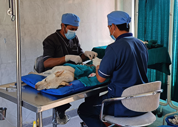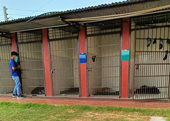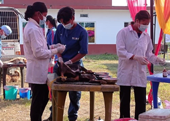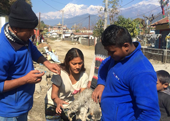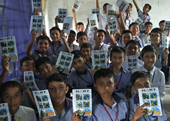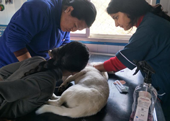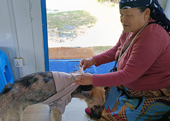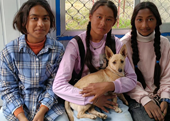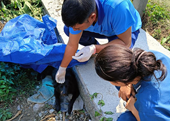HUMANE DOG POPULATION MANAGEMENT
1. Dog population management through neutering in Pokhara and Chitwan
The aim is to humanely facilitate an animal population, specifically dogs and cats, that is at an acceptable level to the community, ensuring they are free of diseases and
never subjected to culling.
HART employs a combination of Animal Birth Control (ABC) techniques to manage the stray dog population. Free-roaming dogs are brought to the clinic, where they are evaluated, sterilized, treated for any ailments, and then released back into their original territory after recovery. Owners and carers are encouraged to bring their animals to the clinic for neutering at a very low cost. Both males and females are neutered but programmes have traditionally focused more on female dog sterilisation.
2. Outreach programmes

On the way to an outreach clinic
Street dogs are a normal part of Nepali life but are known to pose public health issues, particularly when their numbers increase. Culling was the routine method of control by local authorities up to 2017. To address the problems HART collaborates with municipalities to organize mass dog neutering campaigns as a humane and scientific alternative to dog culling. HART carries out temporary neutering camps throughout Nepal. The mobile camps vaccinate and sterilise animals brought in by owners and also dogs collected from the streets that do not have owners.
Although municipalities have funds for dog sterilization programmes, they lack the technical resources to execute them. This is where HART can assist.
RABIES CONTROL AND ERADICATION
1. Mass anti rabies vaccination camps
HART's target is to vaccinate
over 70% of the dog population in a given area as this is the level at which currently accepted statistics determine that the rabies risk to humans becomes minimal.
To achieve this vaccination coverage in a town, HART's staff walk through each ward and vaccinate all un-immunised animals found.
Each jab is recorded in HART's purpose-written mobile phone app. The ward is revisited until the statistics indicate that a minimum of 70% of dogs are vaccinated.
During the programme, staff disseminate information on how to avoid rabies. An annual repetition of the vaccination is crucial to maintain herd immunity.
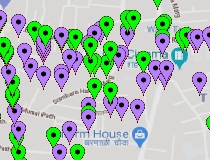
Recording and making public numbers of dogs
2. Accessible updates on prevention measures
Vaccinating dogs against rabies is the WHO recommended method of protecting communities. In order to inform communities about their level of protection the dogdata website shows the details of all vaccinations carried out by HART and by many other key groups involved in rabies work. The site also shows data recorded from censuses and numbers of dogs neutered in specific areas. It is at
www.dogdata.uk
ANIMAL WELFARE IMPROVEMENT
1. Public awareness and school education
Many of the cruelties endured by animals in Nepal are due to a lack of awareness of animals' sentience. HART aims to change this through regular awareness programmes.

Pledges from children to be kind to animals
At public events, HART regularly distributes leaflets providing information on the avoidance of dog bites, rabies, and responsible pet ownership and exhibits posters conveying its messages wherever possible.
Two characters have been created to symbolise the personalities of street dogs, Mutu and Maya (Heart and Love in Nepali).
Staff frequently appear at municipal events and local media, both radio and print, are used whenever possible to improve public awareness regarding animals.
A school programme in Pokhara has gradually expanded over the years. When possible the school's programme is also included in outreach camps.
2. Community survey questionnaire and census
Surveys using phone apps are carried out to determine the attitude of householders toward the animals in their community. These surveys can be tailored to answer specific questions such as awareness of rabies prevention strategies, awareness of animal welfare issues and responsible pet ownership.
When needed a census app is used to determine street animal population levels, status and condition.
3. Low cost clinic
Treating companion animals for disease and injury is a new concept in Nepal. Unfortunately, not everyone can afford the cost of treatment when their pets fall sick. As a consequence, animals are abandoned in the streets adding to the population and causing much suffering to individuals.
HART operates a low-cost clinic that provides affordable veterinary services for pet owners. The aim is to encourage pet owners to vaccinate, neuter, and treat their pets during times of illness. The subsidised clinic model seeks to reduce the financial burden of caring for pets and promote responsible pet ownership.
4. Rescue and treatment
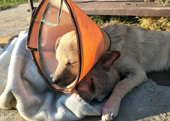
Two rescued dogs in recovery
Street and community animals are prone to disease and injuries, more often than owned animals. HART's Rescue and Treatment programme aims to alleviate the pain and suffering of sick and injured animals on the streets. They are treated as necessary following alerts from the public, locals and tourists. Any animals needing extra nursing or medical care are retained in the clinic and nursed back to health. Once well enough, they are returned to their territories or a designated carer in the community. HART does not work as a sanctuary and strongly encourages the involvement of the community in taking care of the animals around them.
HART is the only provider of emergency veterinary care in its base towns and thus carries great responsibility.
5. Collaborative working with other organizations
HART has now become an integral part of the communities of Pokhara and Chitwan.
HART strongly believes in collaborative working.
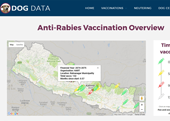
Working collaboratively with Municipal authorities and keeping stakeholders informed
An excellent working relationship has been established with three of the four veterinary schools in Nepal. These are AFU (Agriculture and Forestry University), and Nepal Polytechnic, both in Chitwan as well as IAAS (Institute of Agriculture and Animal Science) in the Lumbini region.
The key stakeholders in HART's vaccination and sterilisation work are the municipal authorities who have responsibility for street animals.Many partneships have been formed over the years with costs being shared equally between partners.
HART is an active member of FAWN (Federation of Animal Welfare Network Nepal), a coalition of many animal welfare organisations in the country.

